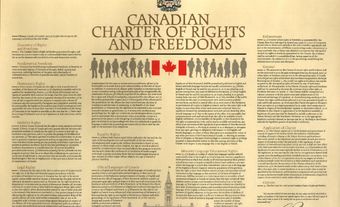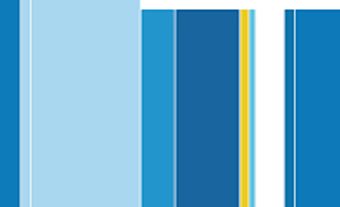Bill 21 (also called An Act respecting the laicity of the State) was passed by the Quebec National Assembly on 16 June 2019. The purpose of this legislation was to confirm the province’s secular status, as well as to prohibit the wearing of religious symbols by civil service employees in positions of authority and by teachers in the public sector. The legislation does not apply to trainee teachers and includes a grandfather clause for those employed prior to the passage of the new legislation. (See Secularism in Quebec.)
Background
Quebec society has gradually been secularizing since the Quiet Revolution. Over time, the State increasingly took precedence over the Catholic Church. In the late 1990s, public education deconfessionalized and Quebec schools were no longer tied to the Catholic and Protestant churches.
The passage of Bill 21 in Quebec was part of the more recent debate regarding secularism which had been continuing for more than a decade. Starting with the debate regarding reasonable accommodation in 2007 (see Bouchard-Taylor Commission) to Bill 62 and the Québec Values Charter, the subject of religious practice in the public domain has been the subject of heated discussion.
While the majority agree on the importance of a secular State (i.e., the separation of church and state), the definition of laicity differs from one group to the next. Some speak of open laicity: i.e., a model of secularism that allows the presence of religion in the public domain, as long as it respects the rights and freedoms of other citizens. In contrast, closed secularism advocates strict religious neutrality in the public domain.
A Controversial Law
Bill 21 derives from a recommendation in the 2008 Bouchard-Taylor report (see Bouchard-Taylor Commission). First of all, it was intended to assert the secularism of Quebec. It formalized the prohibition of religious symbols worn by civil service employees in positions of authority (such as police officers and judges). The government decided to go even further, by including teachers in the public sector. Those employed prior to passage of the legislation were grandfathered in this regard.
The passage of Bill 21 did not go smoothly. The bill was initially criticized by the opposition parties, such as the Quebec Liberal Party and Québec solidaire. In addition, the religious groups affected by the bill were given little input. The legislation was finally passed under closure — by limiting debate. The bill received 73 votes in favour from members of the Coalition Avenir Québec and the Parti québécois, while the 35 members from the Quebec Liberal Party and Québec solidaire voted against it.
The two former commissioners who authored the Bouchard-Taylor report did not support this legislation. Gérard Bouchard asserted, among other things, that the bill was “radical” and unjustified. A number of academics also denounced the new law (see also Universities in Canada). Moreover, humanitarian organizations like Amnesty International publicly opposed Bill 21.
Bill 21 was even criticized during the 2021 federal election campaign (during the party leaders’ English-language debate). Shachi Kurl, the President of the Angus Reid Institute and moderator of the debate, caused quite an uproar by asking Yves-François Blanchet, the leader of the Bloc Québécois, why his party supported “discriminatory” legislation, such as Bill 21 regarding the laicity of the State.
The public, however, appeared to broadly support this new law. A survey conducted by the Government of Quebec several days before the introduction of Bill 21 showed that a majority of the population was in favour of prohibiting the wearing of religious symbols by civil service employees in positions of authority.
Legal Proceedings
The use of the notwithstanding clause (override clause allowing certain sections of the Canadian Charter of Rights and Freedoms to be bypassed) is a major bone of contention. Neither the Quebec charter nor the Canadian charter specifies the conditions in which overrides may be used. In fact, Bill 21 amended the Quebec Charter of Human Rights and Freedoms by adding the following paragraph to its preamble: “Whereas the Québec nation considers State laicity to be of fundamental importance.”
The government decided to use the notwithstanding clause “to avoid lengthy judicial battles”. If that was its intention, the result was entirely different. Bill 21 was contested in court as soon as it was passed. First, Ichrak Nourel Hak (a Muslim trainee teacher who wore a hijab) contested the law, with the support of the National Council of Canadian Muslims and the Canadian Civil Liberties Association (see also Civil Liberties). Then, the English Montreal School Board (EMSB) also decided to challenge Bill 21 before the courts. According to the EMSB, Bill 21 violated Section 23 of the Canadian Charter protecting the right to education in the language of the linguistic minority. The EMSB considered that Section 23 granted it rights regarding the administration of schools, in particular, with respect to the recruiting and hiring of staff — rights which were limited by Bill 21. (See also Section 23 and Francophone Education outside of Quebec.) Later, the Fédération autonome de l’enseignement, a teachers’ union, also filed a request to have several sections of Bill 21 invalidated. In 2022, the federal government announced that it would join the legal challenge against Bill 21 should it reach the Supreme Court of Canada.
In April 2021, the Superior Court of Quebec upheld the application of the Act respecting the laicity of the State. However, the judge stated that the Act should not apply to anglophone school boards or to the members of the National Assembly. This ruling was appealed by both sides. Premier François Legault stated that the ruling was “illogical.”
The law’s notwithstanding clause must be renewed every five years. The legal and political challenges are thus far from over.

 Share on Facebook
Share on Facebook Share on X
Share on X Share by Email
Share by Email Share on Google Classroom
Share on Google Classroom


,_2016_(30216916871).jpg)


